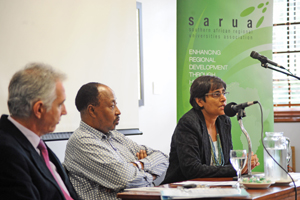SADC universities join forces
18 April 2011 Collaboration: At the Working Group on Research, Development and Climate Change workshop were (from left) vice-chancellor Dr Max Price, deputy vice-chancellor Prof Thandabantu Nhlapo, and Piyushi Kotecha, SARUA CEO.
Collaboration: At the Working Group on Research, Development and Climate Change workshop were (from left) vice-chancellor Dr Max Price, deputy vice-chancellor Prof Thandabantu Nhlapo, and Piyushi Kotecha, SARUA CEO.
Senior university leaders from across the Southern African Development Community (SADC) officially pooled scholastic forces at the establishment of the Deputy Vice-Chancellor Working Group on Research, Development and Climate Change, held at UCT recently.
The initiative, driven by the Southern African Regional Universities Association (SARUA), follows the adoption of a Framework for Action on Climate Change and Adaptation in Higher Education in SADC, formulated at the Vice-Chancellors' Leadership Dialogue, a meeting of vice-chancellors from 24 SADC countries in Mauritius in October 2010.
"SARUA's mandate is to bring people together," said SARUA CEO Piyushi Kotecha. "Today follows on the framework for action we adopted; to generate shared knowledge, build capacity, raise awareness, integrate multiple paradigms and enhance the development of multi-research networks."
In his welcome address, UCT vice-chancellor Dr Max Price stressed the value of collaboration.
"Government participation in global policy on climate changes is often inadequately supported. If we could create a resource through SADC universities that can co-ordinate and provide briefing documents, background information, face-to-face briefings and seminars, there will be an academic authority channel through which policymakers can access this information better."
The same maxim applies to teaching, Price said. "We are all creating teaching programmes and courses which have significant overlap in content. Here, rather than duplicating courses, there's an opportunity for shared common ground and material. It's about stimulating collaborative synergistic research between universities, and sharing a common resource for the region."
The workshop provided a forum for unfettered discussion, and the general consensus was undoubtedly that getting the matter of water and climate change right was critical.
 This work is licensed under a Creative Commons Attribution-NoDerivatives 4.0 International License.
This work is licensed under a Creative Commons Attribution-NoDerivatives 4.0 International License.
Please view the republishing articles page for more information.










